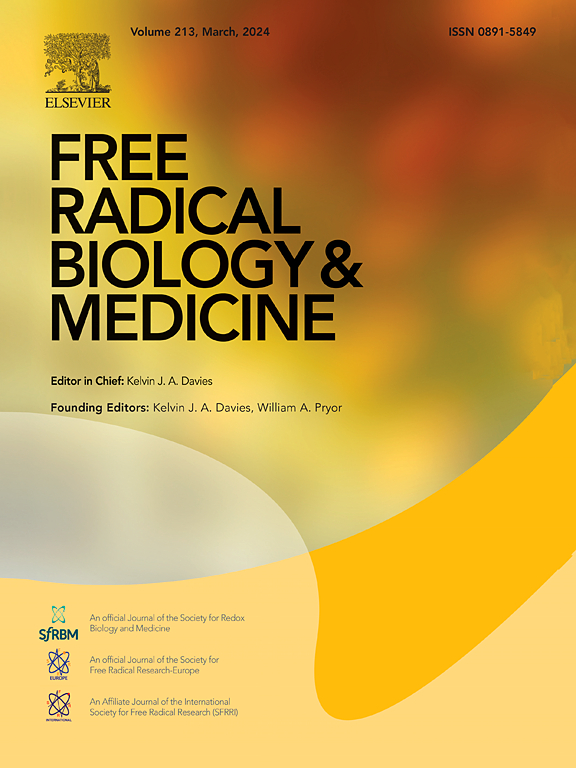Lithium Enhances Ferroptosis sensitivity in melanoma cells and promotes CD8+ T Cell infiltration and differentiation
IF 7.1
2区 生物学
Q1 BIOCHEMISTRY & MOLECULAR BIOLOGY
引用次数: 0
Abstract
Lithium exposure reduces melanoma incidence and mortality, yet its therapeutic mechanisms are unclear. This study explores the effects of lithium on ferroptosis sensitivity and anti-tumor T cell response in melanoma. We found that lithium significantly enhanced RSL3-induced ferroptosis in vitro, evidenced by increased mitochondrial peroxide, lipid peroxidation, and mitochondrial abnormalities. Lithium also inhibited B16-F10 melanoma cell proliferation and migration in a dose-dependent manner. Cell cycle analysis showed lithium and RSL3 induced distinct perturbations, including G2/M and G0/G1 phase arrests. Mechanistically, lithium influenced intracellular ferrous ion levels by downregulating ferritin heavy chain (Fth1), crucial for iron homeostasis. The combination of lithium and RSL3 significantly suppressed tumor growth in mice, correlating with reduced Fth1 expression and increased iron deposition in the spleen and liver, highlighting a novel interaction between lithium and iron metabolism. Additionally, this combination enhanced CD8+ T cell infiltration and IFN-γ expression in the tumor microenvironment, especially among cytotoxic effector CD8+ T cells. These findings reveal the pro-ferroptotic and immune regulation roles of lithium, broaden our understanding of its biological roles, and propose new strategies for ferroptosis-targeted therapies in melanoma.

锂增强黑色素瘤细胞对铁下垂的敏感性并促进CD8+ T细胞的浸润和分化。
锂暴露可降低黑色素瘤的发病率和死亡率,但其治疗机制尚不清楚。本研究探讨了锂对黑色素瘤中铁下垂敏感性和抗肿瘤T细胞反应的影响。我们发现锂在体外显著增强rsl3诱导的铁下垂,证据是线粒体过氧化、脂质过氧化和线粒体异常增加。锂也以剂量依赖的方式抑制B16-F10黑色素瘤细胞的增殖和迁移。细胞周期分析显示,锂和RSL3诱导了不同的扰动,包括G2/M期和G0/G1期阻滞。从机制上讲,锂通过下调铁蛋白重链(Fth1)来影响细胞内铁离子水平,铁蛋白重链对铁稳态至关重要。锂和RSL3联合使用可显著抑制小鼠肿瘤生长,并与Fth1表达降低和脾脏和肝脏铁沉积增加相关,这表明锂和铁代谢之间存在一种新的相互作用。此外,这种组合增强了肿瘤微环境中CD8+ T细胞的浸润和IFN-γ的表达,特别是在细胞毒性效应CD8+ T细胞中。这些发现揭示了锂的嗜铁性和免疫调节作用,拓宽了我们对其生物学作用的认识,并为黑色素瘤嗜铁性靶向治疗提供了新的策略。
本文章由计算机程序翻译,如有差异,请以英文原文为准。
求助全文
约1分钟内获得全文
求助全文
来源期刊

Free Radical Biology and Medicine
医学-内分泌学与代谢
CiteScore
14.00
自引率
4.10%
发文量
850
审稿时长
22 days
期刊介绍:
Free Radical Biology and Medicine is a leading journal in the field of redox biology, which is the study of the role of reactive oxygen species (ROS) and other oxidizing agents in biological systems. The journal serves as a premier forum for publishing innovative and groundbreaking research that explores the redox biology of health and disease, covering a wide range of topics and disciplines. Free Radical Biology and Medicine also commissions Special Issues that highlight recent advances in both basic and clinical research, with a particular emphasis on the mechanisms underlying altered metabolism and redox signaling. These Special Issues aim to provide a focused platform for the latest research in the field, fostering collaboration and knowledge exchange among researchers and clinicians.
 求助内容:
求助内容: 应助结果提醒方式:
应助结果提醒方式:


